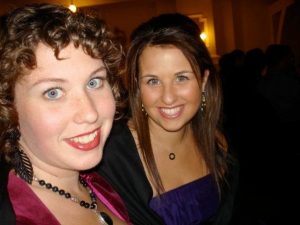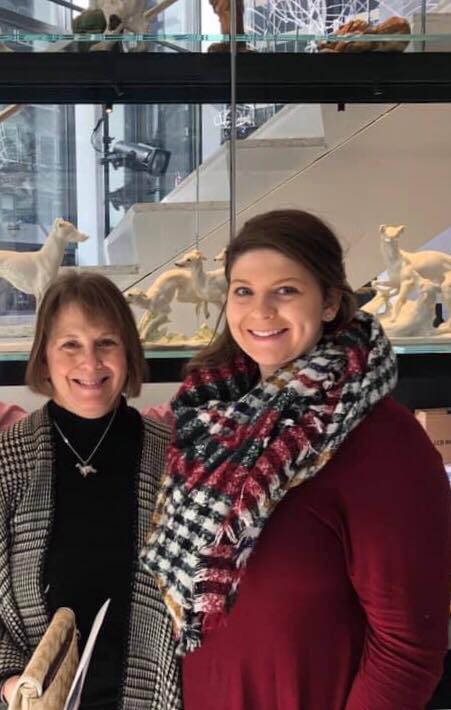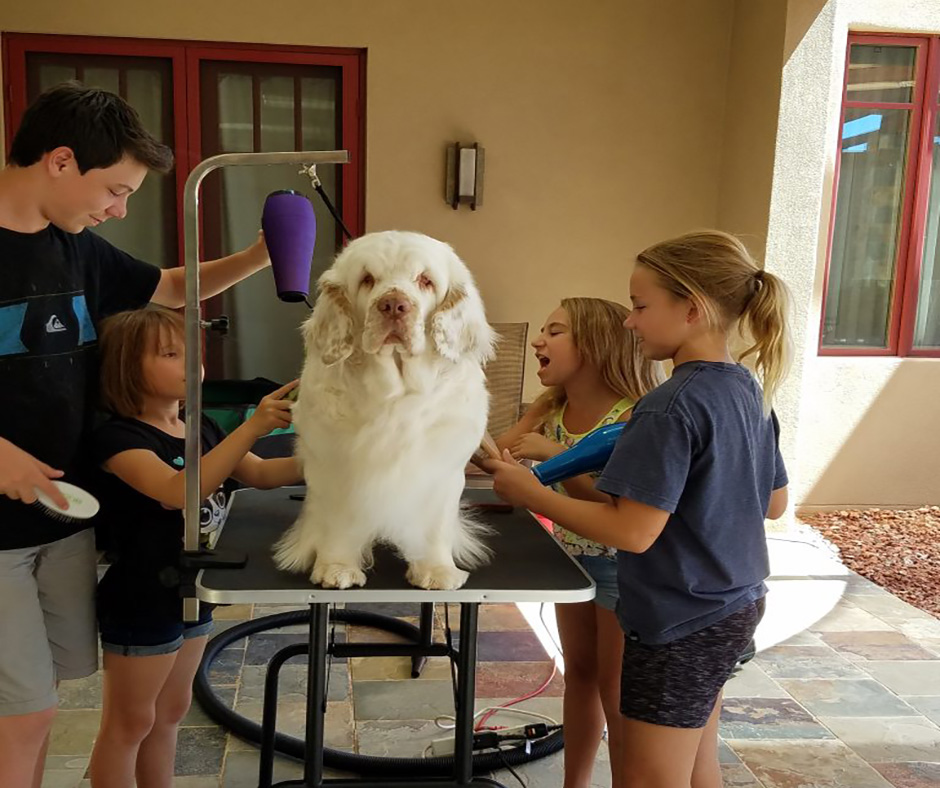419 – Juniors: Skills That Apply in High Powered Careers
Juniors: Skills That Apply in High Powered Careers
 Carley and Cameron Simpson join Laura Reeves for a frank, inspiring conversation on how the skills they acquired as top tier junior handlers have influenced their high powered career paths 20 years later.
Carley and Cameron Simpson join Laura Reeves for a frank, inspiring conversation on how the skills they acquired as top tier junior handlers have influenced their high powered career paths 20 years later.
Work ethic, timeliness, handling disappointment, setting goals, confidence and the edge of determination carried them from rural Washington to the sets of Hollywood and the tracks of international bicycle competitions.
“So really the work ethic and the loyalty and determination and consistency, it all came from having these animals,” Cameron said, “and having to take care of them and knowing that they depend on you, there’s no option to not take care of them.
“It taught us our work ethic. To this day it’s very noticeable in my work environment that I definitely work a lot harder and I take my job very seriously. Anything I do, I put in 100%.”
“Currently I produce television,” Carley said. “I’m an executive producer, just finished up with a Netflix series. (T)imeliness is something I feel every day in my work. Literally we are starting on time and it’s thousands of dollars every minute we go over you know or 10s of thousands of dollars it can be. So the importance of being at a ring at 8:00 AM because you know that that judge is not gonna wait for you has directly translated into my job today.
“When I was in juniors I worked for a number of handlers and I remember I would put post-it notes on my mirror in my bedroom. One of those goals that I had written was to win the Garden. I worked my butt off every little step to try to get to that goal. That goal was always in the back of my mind for everything I did growing up and working with dogs. I didn’t win the Garden, but the fact that I made the finals, the fact that I got Third (in Juniors) it was a cherry on top. That to me was winning. When you learn to work at such a high level in a competition like dog sport, it directly translates then into your later life. You want to always achieve that high level of success again. You’re always working toward, ‘Can I get there. Can I get to that highest level.’”
The only woman in the room
“This (is a) career where it is very uncomfortable to be the only woman standing in the room,” Cameron said of her work in the high-end bicycle industry. “And it’s even more uncomfortable to be the only woman standing in the room who knows more than all of the men in the group and it only takes that little bit, just that break of ice, before everybody else in the room is like, ‘oh OK, yeah we see you as a human, you know we see you as a person, and as an advisor and as an employee, as a helper. All of that has been from dog shows. It’s been from just kind of having that (attitude) of ‘maybe I don’t belong here but I’m going to try anyways’ or I’m going to observe and adapt the situation to win.
“That was something that my mom always taught us. She had this quote, it lives with me every day, which is ‘Life is a game. Play it.’ And I think I took that to the Max. Especially with juniors. If there was a judge who was very eccentric and I could tell that you could win by doing A, B or C, I would do that. A judge who wanted you to look at her every 3 seconds, I did it. I tripped and fell and I won… so it was things like that. I would never show a dog like that, that’s not my style. But that was the game right then and that was the game to win.
“Carley and I are strong enough to realize that we have to love what we do in order for us to put the energy into what we do. We have to love it and so both of us really took that to heart early on. I can’t sit at an office and do this exercise. I have to go out and get a job that it’s gonna push me, that’s going to teach me, that’s ever changing, that’s growing, that has a ton of demand and that’s what we both did. I mean both of us hold very unique jobs in very competitive industries.”
Aim for the Top
“It doesn’t matter what the task is at hand,” Cameron said. “Do it better than anyone else around you. Then you won’t have to do it again and can achieve something better after that. No matter what you’re doing, if you’re going to show this dog study the ring, study the judge, study the game and play it. Don’t just go in half-ass and try to see what you can do. That’s never really gonna work.”
365 — Junior Showmanship from Competing to Judging
Junior Showmanship from Competing to Judging
Marti Day and Sarah Congleton are a mother-daughter junior showmanship judging juggernaut. Sarah and her brother Tanner started showing in juniors in 2005. Marti was the support person and chauffer. Mother and daughter both judged the huge junior showmanship competition at Orlando before the AKC National championship.
The family traveled to dog shows regularly, putting 250,000 miles on the family Suburban’s odometer. Sarah and Tanner competed in 4-H, juniors and regular breed competition, eventually working for handlers and breeders.
“We were so fortunate to work with top notch breeders,” Marti said. “We had people who offered us dogs and helped the kids learn how to groom. Parents should never do work for the juniors.”
Marti said she was rarely worried about her children traveling with breeders and handlers. The siblings generally were together, Marti said, adding “the Dog show world, in terms of children, really look after each other in an incredible way.”
As a parent, Marti expressed pride for her children’s success.
“The sport has made them outspoken, compassionate, understanding, motivated, organized young adults,” Marti said.
Sarah observed that junior entry numbers are decreased in recent years and throughout the purebred dog fancy “more has to be done than just saying juniors are the future of the sport.”
Mentorship along the lines of “Jody’s Juniors” and building a “dogmanship” program are some of Sarah’s emphasis.
“It’s not just running around the ring in a Saint John’s suit, we need to teach basic animal husbandry,” Sarah added.
Marti and Sarah both emphasized safety in judging junior showmanship, as well as “who would I trusty MY dog to.”
“I like to see the juniors and their dog relax. Everybody on edge isn’t good for either one. And, don’t be a prima donna. I want to see the rapport between you and your dog,” Marti said.
39 – Jody’s Juniors: Teaching our next generation of Dog Show Handlers
Jody Davidson – Jody’s Juniors
Once upon a time a Junior Handler herself, Jody Davidson is a professional dog trainer, member of Assoc of Professional Dog Trainers, and Canine Good Citizen Evaluator. Located in Arizona, Jody leads a team of young dog show enthusiasts to become not only good handlers, but the life skills of responsibility, discipline, and compassion.
From chores to grooming, lessons on toenails, healthy poop, heatstroke, sportsmanship, and nutrition; Jody’s Juniors learn how to care for and train dogs.



